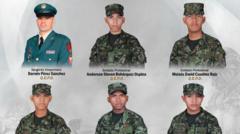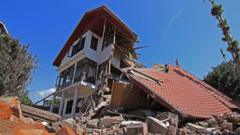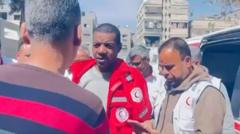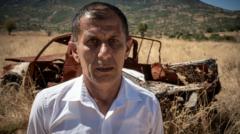The recent clashes in Syrian Druze areas highlight the persistent instability in the country, exacerbated by external influences and ethnic tensions.
Clashes in Syria's Druze Regions Signal Growing Instability

Clashes in Syria's Druze Regions Signal Growing Instability
Violence erupts as factions clash, igniting fears of wider conflict in post-Assad Syria.
In a deeply concerning development, deadly clashes erupted between Islamist armed groups, the Syrian security forces, and fighters from the Druze community near Damascus. This violence has been labeled an “unjustifiable genocidal campaign” by Sheikh Hikmat al-Hijri, the spiritual leader of Syria's Druze population. His condemnation reflects the broader anxiety over the nation’s security situation, further complicated by ongoing inter-group tensions nearly 13 years after the civil war began.
The hostilities were sparked when violence flared in Ashrafiyat Sahnaya, with reports indicating that at least 101 people were killed, including a significant number of Druze community members and security forces. The Syrian Observatory for Human Rights documented that among the dead were 71 Druze individuals, of which 10 were civilians. The onslaught involved various factions and drew the attention of external powers, as Israel conducted airstrikes to protect Druze civilians.
In the aftermath of the clashes, the Syrian authorities claimed responsibility for deploying forces to stabilize the area, while accusing “outlaw groups” of instigating the violence. However, suspicions linger over these groups, especially as the current Syrian leadership draws scrutiny for potentially fostering ties with jihadist factions.
The clashes came amidst complex geopolitical dynamics, with Israel asserting its military operations were necessary to safeguard the Druze minority, reflecting Israel's historical ties with this community. Conversely, Israel's actions have been met with a stern rebuke from Turkey, which condemned the strikes as provocations, showcasing the fraught relations between nations involved in the Syrian crisis.
Currently, a fragile ceasefire appears to hold, yet the rapid escalation of disputes, fueled by social media, reveals a precarious situation. Syria’s road to a stable future is obstructed by existing rivalries, both internally among diverse ethnic groups and externally with regional powers pursuing divergent interests. The need for internal reconciliation, alongside robust international support, remains critical for restoring peace and security in this war-torn nation.
The hostilities were sparked when violence flared in Ashrafiyat Sahnaya, with reports indicating that at least 101 people were killed, including a significant number of Druze community members and security forces. The Syrian Observatory for Human Rights documented that among the dead were 71 Druze individuals, of which 10 were civilians. The onslaught involved various factions and drew the attention of external powers, as Israel conducted airstrikes to protect Druze civilians.
In the aftermath of the clashes, the Syrian authorities claimed responsibility for deploying forces to stabilize the area, while accusing “outlaw groups” of instigating the violence. However, suspicions linger over these groups, especially as the current Syrian leadership draws scrutiny for potentially fostering ties with jihadist factions.
The clashes came amidst complex geopolitical dynamics, with Israel asserting its military operations were necessary to safeguard the Druze minority, reflecting Israel's historical ties with this community. Conversely, Israel's actions have been met with a stern rebuke from Turkey, which condemned the strikes as provocations, showcasing the fraught relations between nations involved in the Syrian crisis.
Currently, a fragile ceasefire appears to hold, yet the rapid escalation of disputes, fueled by social media, reveals a precarious situation. Syria’s road to a stable future is obstructed by existing rivalries, both internally among diverse ethnic groups and externally with regional powers pursuing divergent interests. The need for internal reconciliation, alongside robust international support, remains critical for restoring peace and security in this war-torn nation.






















